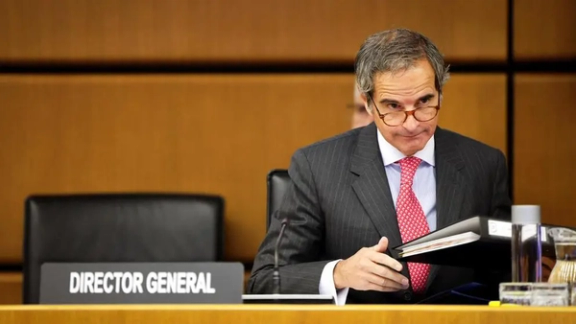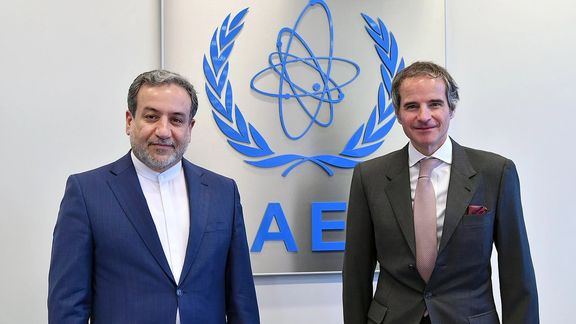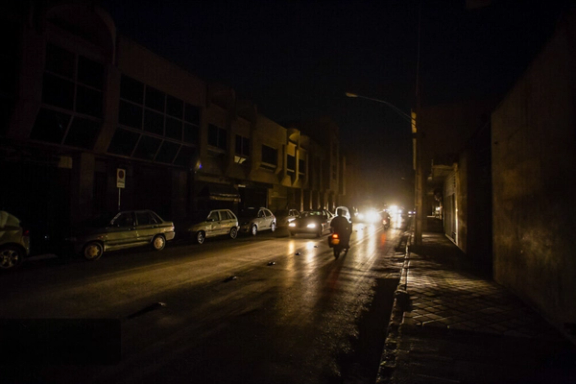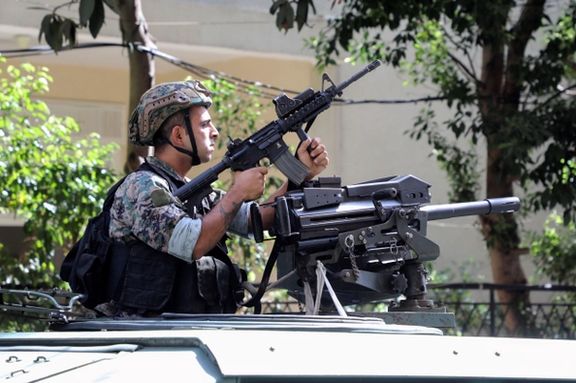IAEA chief says Iran agreed to cap 60% uranium stockpile

IAEA Director General Rafael Grossi says that Iran has agreed to freeze its uranium stockpile enriched to 60% following his request during recent talks in Tehran.

IAEA Director General Rafael Grossi says that Iran has agreed to freeze its uranium stockpile enriched to 60% following his request during recent talks in Tehran.
"I made a request for Iran to stop increasing the stockpile of 60%, and this was accepted," Grossi said in his report to the agency's Board of Governors in Vienna on Wednesday.
The IAEA chief said the agreement to freeze the 60% uranium stockpile does not imply an immediate resolution to broader concerns about Iran’s nuclear activities, however.
The agency remains unable to verify certain aspects of Iran’s program due to limited access following Tehran's cessation of its JCPOA-related commitments in early 2021.
Citing reports to the body's member states, Reuters reported that Iran has offered to cap its stock of near weapons grade nuclear fuel on condition that no censure resolution will be issued at a Wednesday meeting of the UN nuclear watchdog.
The confidential reports by the International Atomic Energy Agency (IAEA) say Tehran has made preparations to cap the stockpile at around 185 kg (407 lbs). Iran also agreed to consider accepting the appointment of four additional experienced IAEA inspectors after having banned around one third, last year.
Diplomats informed Reuters that Western powers are advocating for a censure resolution at the IAEA Board of Governors, despite Iran's reported offer. Similarly, The Wall Street Journal cited sources stating that France, Britain, and Germany (the E3) plan to proceed with the resolution during Wednesday's meeting.
In his latest report to the Board of Directors, the Director General of the IAEA said Iran's nuclear program has continued to grow, in spite of global sanctions. “Following my last report, Iran’s stockpile of uranium enriched up to 20% and up to 60% U-235 continued to increase," he said.
The report also states that the IAEA's findings regarding particles of uranium of human origin at undeclared locations in Iran remain inconsistent, and the agency requires information about the current whereabouts of the nuclear materials or related contaminated equipment.
Grossi also addressed the destruction of a covert nuclear research facility of the Islamic Republic in Parchin following an Israeli attack, stating that the IAEA does not consider this site a nuclear facility, and there is no indication of nuclear material being present there.
Grossi visited Iran’s Fordow and Natanz enrichment facilities during his recent trip.
Referring to the long and turbulent process of monitoring Iran's nuclear program, he said "It takes effort, determination, and patience."
"This is not something that will be solved overnight," Grossi added.
While exchanges between Iran and the IAEA on verification measures are ongoing, Grossi acknowledged the need for "more information from Iran" to address the concerns comprehensively.

Iran warned of an "immediate and decisive" retaliatory response if a widely anticipated Western-backed censure resolution is passed on Thursday and lobbied several member states of the UN's nuclear watchdog's governing body to reject it.
The foreign ministry's legal deputy was quoted by local media as saying, "We have clearly stated in advance that if the resolution is passed, we will respond decisively and immediately. The Atomic Energy Organization of Iran is prepared to implement the decision in the very hour the resolution is approved."
The United States, Germany, France and Britain are adamant to pursue a censure resolution at the quarterly meeting of the International Atomic Energy Agency for Tehran's lack of cooperation with the UN watchdog and other violations.
Foreign ministry's Kazem Gharibabadi blamed the sponsors of the resolution for disregarding Iran's recent gesture of promising to stop high-level uranium enrichment. "This move by Iran is, in fact, a response to the unconstructive approach of these few countries and their disregard for Iran's goodwill."

The Iranian foreign minister Abbas Araghchi on Wednesday called the foreign ministers of Brazil, South Africa, Bangladesh, Algeria, Burkina Faso, Pakistan - all on the Board of Governors of the International Atomic Energy Agency (IAEA) - to warn against the adoption of the resolution put forward by Western powers.
"The push by France, Britain and Germany for a resolution against Iran would only weaken and disrupt the interactional processes between Iran and the Agency," Araghchi said, according to media reports in Iran.
He called on the member states voting on the resolution to block it.
Previous voting patterns suggest that proposals backed by the main Western countries easily pass. A successful resolution could pave the way for the three European powers to trigger a "snapback mechanism" to restore UN sanctions imposed on Iran before the 2015 nuclear deal.
The planned censure is due to be approved despite Tehran offering to cap its highly-enriched uranium stock.
IAEA Director General Rafael Grossi says that Iran has agreed to freeze its uranium stockpile enriched to 60% following his request during recent talks in Tehran.
"I made a request for Iran to stop increasing the stockpile of 60%, and this was accepted," Grossi said in his report to the agency's Board of Governors in Vienna on Wednesday. The freeze would not resolve broader issues about Iran’s nuclear activities, he added.
Iran began enriching uranium up to 60% after a 2015 international deal unraveled when Donald Trump unilaterally withdrew the United States from the agreement.
“The US concerns have been all along about Iran engaging in enriching uranium to 60%. We're very concerned about it,” US alternative ambassador to the United Nations Robert Wood told Iran International on Wednesday. “I know the IAEA Board is going to be looking at this issue. We're reviewing the report of IAEA Director-General."
The IAEA’s latest confidential report confirms that Iran has made preparations to cap its stockpile at around 185 kg, according to Reuters. Iran also agreed to consider accepting the appointment of four additional experienced IAEA inspectors after having banned around one third last year.

As power outages gain pace with the onset of winter, Iranians are venting their discontent and chronicling the impact of the blackouts on their daily lives in videos and voice notes shared to Iran International.
Iran has implemented rolling power cuts for residential and commercial areas this month due to a severe shortage of natural gas, the primary fuel source for the country's power plants.
Iran holds the world’s second-largest natural gas reserves, yet US-led sanctions have hindered its extraction efforts by restricting investment and access to advanced technology. As a result, Iran's gas production is gradually declining.
Many viewers reached out to Iran International via its social media platforms to anonymously share their experiences on the ongoing power cuts, which they attribute to government incompetence.
From hospitals to schools, businesses to homes, the outages have disrupted routines and caused significant inconvenience.
In one instance, a citizen sent a video showing a medical imaging center operating in the dark. "This is our situation! We've been here for two hours, and a patient is waiting with an IV drip," the person said.
For many businesses, the past week's power cuts have meant closures, as many lack access to emergency power - a struggle apparently not shared by officialdom.
Earlier on Tuesday, the power in Tehran's City Council was cut off during a session, but the meeting continued using emergency power.
Despite repeated promises to phase out the use of the highly polluting fuel oil - locally called mazut - in power plants, dozens reported continued mazut burning and air pollution.
The government had initially framed these rolling blackouts as a necessary measure to avoid resorting to mazut or diesel. To further complicate matters, officials have confirmed shortages of both mazut and diesel.
"Both the power went out and the mazut burning continued, and the air became polluted," one citizen said. Another sent images of mazut burning at the Rajai power plant in the northern Iranian city of Qazvin, saying, “The Islamic Republic has set us back centuries and ruined our lives.”
Hazardous
The Tehran Air Quality Control Company reported on Tuesday that the capital's air quality had been hazardous for the past 24 hours. Since the beginning of the Iranian year (March 21), Tehran has only had five days of clean air.
Mazut contains high levels of sulfur and other toxic compounds, and its combustion produces large amounts of particulate matter and toxic gases.
These pollutants directly contribute to air pollution and increase the risk of respiratory and cardiovascular diseases.
Some government officials have shifted blame onto the public, urging them to reduce energy consumption or pay extra.
On Sunday, November 17, the government issued a decree ordering an increase in household gas tariffs and authorizing provinces to use mazut in all power plants and industries.
Last week, Mohammad-Jafar Ghaempanah, President Masoud Pezeshkian's executive deputy, blamed the public for the shortages and mazut burning, saying that citizens should reduce their home temperatures by a few degrees and consume less gas and electricity to reduce blackouts.
Pezeshkian echoed this advice, urging people to conserve energy. He also claimed that Iran consumes about three times more electricity than European countries. "I wear warm clothes at home. Other people can do that too,” he said.
"Don't blame the people"
However, these calls have been met with widespread criticism, with many people saying Iran is a resource-rich country and that government ineptitude is the root cause of the crisis.
In September, Hassanali Taghizadeh, the chairman of Iran Electrical Industry Syndicate, rejected claims that domestic use is disproportionately high, saying that Iranian households consume about half the electricity per capita compared to Europe.
"Don't blame the people. Don't falsely claim that people's consumption is high. The average per capita consumption of Iranians is 1,220 kilowatt-hours per year, while in Europe it is 2,120 kilowatt-hours," he said. According to Eurostat, the electricity consumption per capita in the household sector in the EU in 2022 was 1,584 kWh.
In a video widely shared online, a baker in the southern oil-rich city of Ahvaz pasted spoiled dough on the door of the local electricity office to protest the power cuts. In the video, he said he loses 50,000,000 rials (about $75) every week due to power outages. An average Iranian earns about $200 per month.
Several people also reacted to the remarks of Vahid Yaminpour, a state television presenter and secretary of the Supreme Council of Youth at the Ebrahim Raisi administration, who described the power cuts as a "positive event" to strengthen the family foundation.
"In Lebanon, even in non-war conditions, many people have about four hours of state electricity," Yaminpour said. "Be grateful and don't complain."
Rejecting these remarks, one viewer sent an audio file saying that Iran and Lebanon are not equal in terms of natural resources and that Iran is one of the world's most energy-rich countries.
Another said in a video: "There are donation boxes all over the cities to help the people of Gaza and Lebanon, while the officials of the Islamic Republic don't care about the Iranian people at all."
Recounting power outages lasting hours in Fooladshahr in central Iran, another viewer was more harsh, saying Iranian officials are incapable of providing for the welfare of their citizens and only know how to launch missiles.

Experts in Lebanon have called for international backing for the cash-strapped Lebanese Armed Forces if a ceasefire is to be sustained between Iran-backed Hezbollah and Israel.
While US envoy Amos Hochstein suggested a deal is within reach during his trip to Lebanon on Tuesday, the situation on the ground appears far more bleak.
“The army doesn’t even have money to put fuel in the patrol trucks,” said a senior Lebanese politician opposing Hezbollah. He spoke to Iran International on condition of anonymity after successive death threats from the group the US and others deem 'terrorist'.
“UNIFIL has no power militarily and it depends on the LAF [Lebanese Armed Forces], but mostly, the LAF isn’t even able to patrol with UNIFIL, which is a huge reason the latest conflict has escalated to this degree," he told Iran International.
UN peacekeeping forces, UNIFIL, were stationed around southern Lebanon since 2006 under UN Resolution 1701 after the second Lebanon war between Hezbollah and Israel.
Though first created in 1978, following the crisis of 2006 crisis, the UN Security Council strengthened the mandate of UNIFIL, allowing them to "monitor the cessation of hostilities; accompany and support the Lebanese armed forces as they deploy throughout the south of Lebanon; and extend its assistance to help ensure humanitarian access to civilian populations and the voluntary and safe return of displaced persons".

However, the politician, who has held senior government positions, warned that without international funding and binding agreements, the LAF risks remaining a “toothless tiger,” as evidenced in recent years.
“The Lebanese economy is in collapse and the army has been one of the biggest losers, which of course, impacts the country’s security at the hands of Hezbollah which has infiltrated every institution and border areas," he said.
Though Israel has severely weakened Hezbollah since it stepped up its offensive in September, it has a barrage of firepower that continues to see dozens of projectiles fired into Israel daily.
In September, targeted air strikes saw Israel take out swathes of the group’s leadership as high as long-time leader Hassan Nasrallah, while a two-day operation saw around 1,500 Hezbollah operatives taken out of action when pagers and walkie-talkies simultaneously exploded.
UN Resolution 1701 aimed to push Hezbollah north and disarm all armed groups in a designated area of southern Lebanon. However, this was never fully implemented, with both Hezbollah and Israel accused of violating the agreement. Additionally, other armed groups, such as Palestinian Islamic Jihad, continued to operate in the region.

Consisting of around 80,000 troops, the LAF has no air force and is not strong enough to take on either Hezbollah or an Israeli onslaught, its role being mostly limited to supporting civilians.
Andrew Fox, a former British paratrooper and fellow at the Henry Jackson Society, said the weakness of the LAF will be a sticking point for any peace moving forward.
Speaking to Iran International he said: "A key issue with this proposed peace deal is the lack of preparation and capability of the Lebanese Army. Even if not sympathetic to Hezbollah, they are far less well armed and motivated."
With Hezbollah still stronger and harder to control, the LAF will need to be ready for a potential re-entry of the group into southern Lebanon if a deal really forces a retreat to north of the Litani River as was proposed previously.
"This will present them with a real issue," added Fox. "If the LAF attempt to police the ceasefire and are defeated in combat, where does this leave the peace deal? It is hard to see how anything will be enforced if the IDF does not have the oversight to be able to step back in and interdict Hezbollah, should they try to reinfiltrate the South."
If a ceasefire is put into place, the Lebanese army will be expected to deploy thousands of troops south in order to maintain peace. However, with Hezbollah still significantly more powerful and better funded by its patron, Iran, the process will not be easy.
"The Lebanese army is in a situation that is sensitive and difficult. It cannot practice normal missions like the armies of other countries because there is another military force in the country," retired Lebanese brigadier general Hassan Jouni told Reuters, referring to Hezbollah.
On Tuesday, LAF chief, General Joseph Aoun, presented proposals for the first phase of a deployment in the south, sharing the army’s needs in terms of armament, logistical and financial support.
In August, the Lebanese government, which is divided on sectarian lines amid years of crisis, issued “initial approval” for Prime Minister Najib Mikati’s proposal to recruit 1,500 new troops for the army, part of a plan prepared by the army to recruit 6,000 soldiers before developing a plan for its deployment.
Ultimately, the government will have to approve the exact nature of the deployment, but in the end, the question remains as to whether Hezbollah will respect its authority.
Hezbollah affiliated Al-Akhbar said there were still significant “knots” in the negotiations. Quoting informed sources, it said problems remained around borders, which it said was “the knot of knots”.

An Iranian political activist has accused security forces of sexual and verbal abuse when he was arrested in Tehran on Monday.
Writing on X, Hossein Ronaghi detailed his allegations. "Inside the vehicle, they restrained both of my hands. The driver kept repeating vulgar insults about my mother. The one seated on my left grabbed my left hand and forcibly placed it on his groin, demanding that I touch him," he said.
He accused multiple officers of having inflicted verbal and physical abuse. "The officer on my left slid his hand under my shirt and commented to the one on his right, 'he's so pale, I want him to be my bride tonight in detention.' The other added, 'I'll take his mother in front of his eyes,'" he wrote on X.
Ronaghi, a 37-year-old blogger and dissident, had staged a sit-in protest to demand justice for fellow activist Kianoosh Sanjari, who committed suicide last week in protest against government oppression.
The journalist and activist had warned in a social media post that he would end his life unless several political prisoners, including Fatemeh Sepehri and Toomaj Salehi, were released.
Ronaghi used X to highlight problems faced by dissidents under the Islamic Republic's legal system, issues highlighted by international rights groups such as Amnesty International which has accused Iran of forced confessions among other practices such as torture.
"These are the same people who use such methods to extract confessions from people in Ekbatan," he wrote, referring to a neighborhood in western Tehran where security forces have been accused of coercing protesters into false admissions.
Last week, Iran's judiciary issued death sentences for six individuals living in Ekbatan accused of involvement in the killing of a Basij militia member during the nationwide protests that erupted in 2022.
Human rights organizations have repeatedly documented the systematic use of sexual violence in Iran’s prisons. Amnesty International reported in March 2023 that detained protesters, including children, were subjected to rape, groping, and electric shocks to the genitals. The organization highlighted these methods as tools to punish and extract confessions from detainees.
Ronaghi has been arrested multiple times since 2009 and has long written of torture in custody. Released on bail in November 2023 after a prolonged hunger strike, he has faced ongoing harassment from authorities.
He lost a kidney during a previous incarceration and continues to suffer from severe health complications. He has currently sewn his lips together in protest in a bid to raise awareness to the case of Sanjari.

Iran’s foreign minister has been reaching out to his counterparts and the head of the UN nuclear watchdog ahead of the agency's Board of Governors' expected passage of a censure resolution against Tehran.
In a phone call with South African counterpart Ronald Lamola on Wednesday, Abbas Araghchi warned that the resolution proposed by three European powers at the IAEA’s Board of Governors meeting would further complicate the situation.
The censure resolution against Iran was officially added to the Board's agenda on Tuesday night. France, Britain, Germany, and the United States are set to present the resolution during Wednesday’s meeting.
Araghchi also reiterated the sentiment in a phone call with the IAEA chief Rafael Grossi, saying that “if the other parties disregard Iran's goodwill and cooperative approach and pursue unconstructive actions by issuing a resolution at the IAEA Board of Governors meeting, Iran will respond in an appropriate and proportional manner."
In another phone call with French Foreign Minister Jean-Noël Barrot Tuesday night, he also said that if Iran's seek confrontation during the BoG meeting, the Islamic Republic will respond appropriately.
“This measure by the three European countries is in blatant contravention of the positive atmosphere created in the interaction between Iran and the Agency,” the Iranian foreign minister told his French counterpart. “It will only make matters more complicated.”
The planned censure is likely going through despite Tehran offering to cap its highly enriched uranium stock.
Previous voting patterns suggest that proposals backed by the key Western countries easily pass. A successful resolution could be a catalyst for France, Britain and Germany to trigger a so-called "snapback mechanism" to restore UN sanctions imposed on Iran before a 2015 multilateral nuclear deal.
The United States remains tightly coordinated with its European partners in advance of the IAEA Board of Governors meeting and strongly supports efforts to hold Iran accountable, State Department spokesperson Matthew Miller told Iran International, urging Tehran to cooperate with the IAEA.